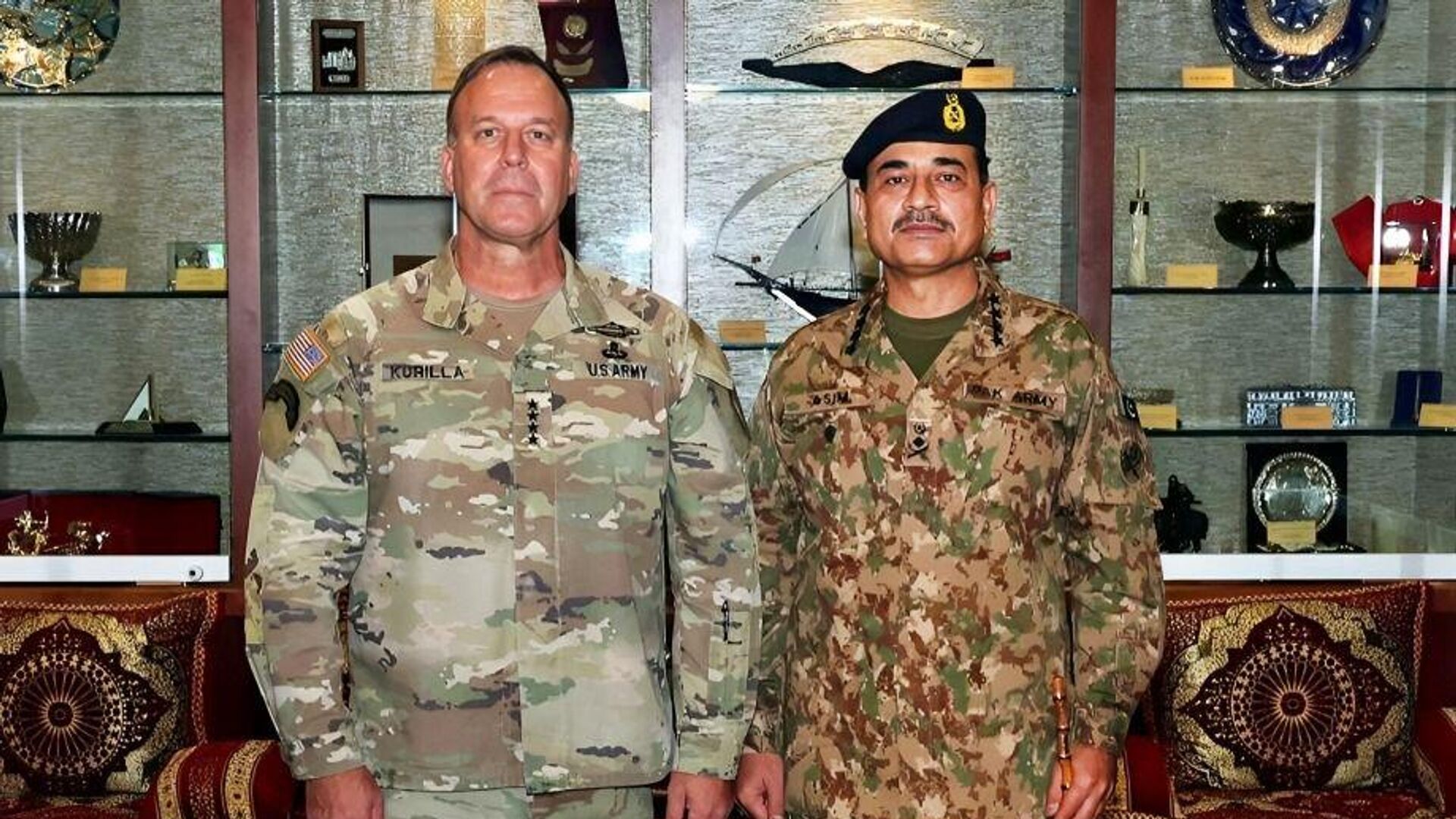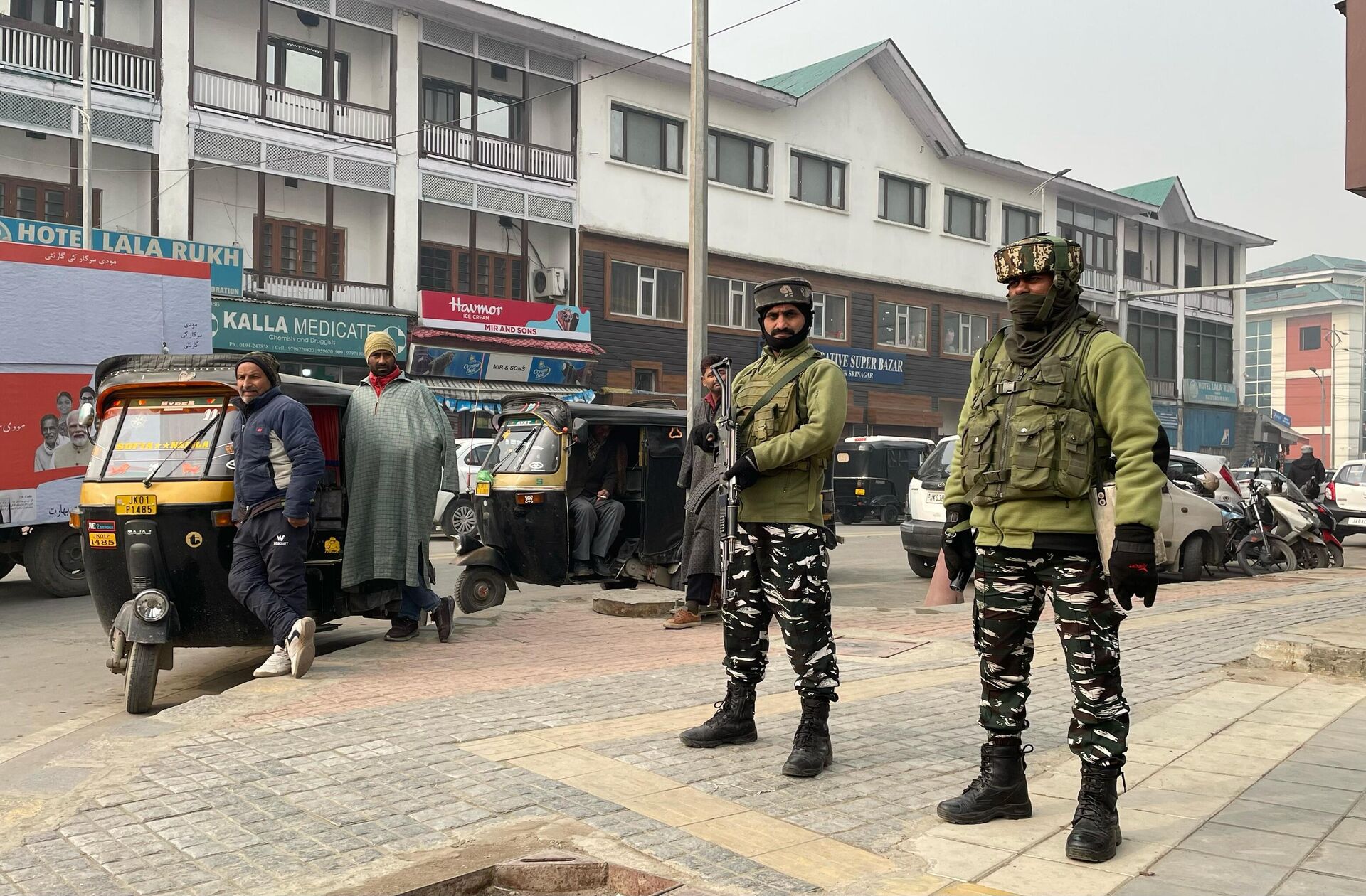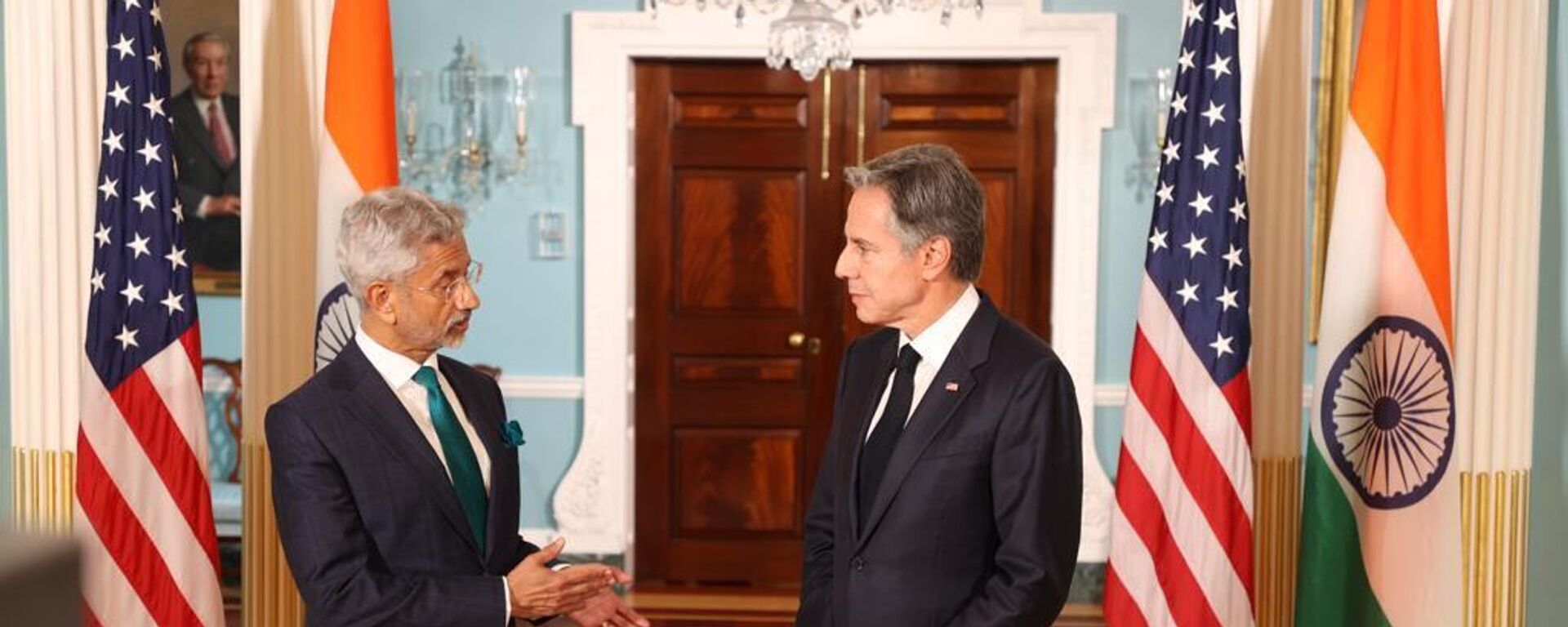https://sputniknews.in/20231222/us-stirs-up-trouble-in-indias-neighbourhood-by-cozying-up-with-pakistan-5933308.html
US Stirs Up Trouble in India’s Neighbourhood by Cozying up with Pakistan
US Stirs Up Trouble in India’s Neighbourhood by Cozying up with Pakistan
Sputnik India
India has reacted with concern to the recent weeklong visit of Pakistan's Chief of Army Staff (COAS) General Asim Munir to the US.
2023-12-22T18:18+0530
2023-12-22T18:18+0530
2023-12-22T18:18+0530
sputnik opinion
india
pakistan
us
joe biden
imran khan
arindam bagchi
tehreek-e-taliban pakistan (ttp)
bharatiya janata party (bjp)
taliban
https://cdn1.img.sputniknews.in/img/07e7/0c/16/5935318_0:0:920:517_1920x0_80_0_0_a6e046ee551bf8f0630828a8991905bf.jpg
On Thursday, India’s Ministry of External Affairs (MEA) spokesperson Arindam Bagchi told a weekly briefing in New Delhi that India's "concerns about Pakistan's support for cross-border terrorism were well-known."While India and the US have cultivated a close strategic relationship in recent years, disagreements over Pakistan have surfaced from time to time.India strongly protested the Biden's administration's decision to resume military aid to Pakistan last year, after the US State Department sanctioned a $450 million Foreign Military Sale (FMS) package for maintaining Pakistan Air Force’s (PAF) F-16 fighter jets.Indian foreign minister S Jaishankar said at the time that, in most of the cases, these American systems end up deployed against India rather than in counter-terror operations at the Afghanistan border.Commenting on India’s longstanding concerns vis-à-vis cross-border terrorism from Pakistan, a spokesperson of the ruling Bharatiya Janata Party (BJP) told Sputnik India that Islamabad has been a “constant threat to peace in South Asia”.The Indian veteran underscored that New Delhi stood for “peace, zero-tolerance towards terrorism and respect for international covenants”.He said that New Delhi has always been in favour of promoting stability and dialogue in the region.What Was Discussed During Pakistan Army Chief’s Visit?During his visit which began last week, the Pakistan Army chief held meetings with US Secretary of State Antony Blinken, US Defense Secretary Lloyd Austin as well as General Michael Erik Kurilla, Commander United States Central Command (CENTCOM).A statement by Pakistan's military media wing Inter-Services Public Relations (ISPR) said that "counter terrorism cooperation and defence collaboration were identified as core areas of cooperation" between the two countries.General Munir's visit took place against the backdrop of increased attacks by Tehreek-i-Taliban Pakistan (TTP)*, a banned terrorist group which Islamabad claims is being sheltered by the Taliban** authorities in Afghanistan.According to Pakistan Institute of Conflict and Security Studies (PICSS), Pakistan witnessed nearly 664 terrorist attacks in January-November 2023 period, a year-on-year rise of nearly 67 percent. The increased intensity of the terrorist attacks coincides with TTP walking out of a ceasefire agreement with Pakistan last November.This month, 23 Pakistan soldiers were killed after an explosives-laden vehicle rammed into a military base at Dera Ismail Khan located in Khyber-Pakhtunkhwa province. Worryingly for Pakistan, the attack has been claimed by Tehreek-e-Jihad Pakistan (TJP), which claims to be an offshoot of TTP.On Thursday, Pakistan's Ambassador to the United Nations (UN), Munir Akram, told a UN Security Council (UNSC) briefing that Islamabad had "clear evidence" that TTP was being backed by its "main adversary". Media reports in Pakistan claim that the reference was to India, though Akram didn't name any country.Pakistan Army Chief Reiterates Stance on KashmirThe Pakistan Army Chief also told the Biden administration that the resolution of the Kashmir "issue" was important from the view of maintaining "strategic stability" in South Asia.According to a readout of Munir's meeting with American think tanks, the Pakistan Army chief said that no "unilateral" action could alter the "nature" of the dispute and that it must be resolved through relevant UNSC resolutions.The Indian Parliament in 2019 voted to abrogate Article 370 (a temporary provision in Indian Constitution) in Jammu and Kashmir, a step towards politically integrating the region with the rest of the country.This month, the Indian Supreme Court upheld the constitutional validity of the Parliament's decision.On several occasions, senior ministers of Prime Minister Narendra Modi's cabinet have also expressed the intention to re-take Pakistan-occupied Kashmir (PoK).New Delhi says the region has been under "illegal occupation" of Pakistan since 1948 after Pakistan-backed militants ran over the Muslim-majority region before the Indian military intervened and stopped them at what is currently the Line of Control (LoC).Subhash Kapila, a former Indian diplomat and a veteran, told Sputnik India that despite Pakistan’s attempts to rake up Kashmir were all but futile.Are Indian Concerns About Growing US-Pakistan Defence Cooperation Legitimate?A widely mulled question in Indian strategic circles is about the intention of the Biden administration in giving audience to a Pakistan Army chief at a time when a caretaker government is in power, and elections are scheduled in coming months.While Pakistan was used as a staging post for American-led International Security Assistance Force (ISAF) operations in Afghanistan during the War on Terror, the Biden administration accused Islamabad of a “double game” on terrorism as it sheltered Taliban which the US was fighting.At the same time, Pakistan’s then Prime Minister Imran Khan grew increasingly critical of the US before being toppled in a parliamentary vote in April 2022. Khan lauded the Afghans for “breaking the shackles of slavery” after the Taliban came back to power in August 2021.As far as the Pakistan Army was concerned, Sajjanhar reckoned that it very well understood that the US still retained the military capability to conduct “over-the-horizon” operations in Afghanistan to deal with terrorist threats from groups like TTP.He recalled that the US demonstrated its military capabilities in August 2022 after it carried out a drone strike that took out Al-Qaeda*** leader Ayman al-Zawahiri.Commenting on India’s concerns about US-Pakistan cooperation, Sajjanhar said that New Delhi will have to “keep pressing” Pakistan to “cease using cross-border terrorism as an instrument of state policy”.He noted that India wouldn’t normalise ties with Pakistan till the problem of cross-border terrorism was addressed.*banned terrorist group**under UN sanctions***banned terrorist group
https://sputniknews.in/20231129/india-should-closely-watch-us-assertiveness-in-south-asia-experts--5637412.html
india
pakistan
us
jammu and kashmir (j&k)
islamabad
china
indo-pacific
afghanistan
ukraine
russia
Sputnik India
feedback.hindi@sputniknews.com
+74956456601
MIA „Rossiya Segodnya“
2023
Dhairya Maheshwari
https://cdn1.img.sputniknews.in/img/07e6/0c/13/138962_0:0:641:640_100x100_80_0_0_2cb44360dbcdf6d84bf4b299cd045917.jpg
Dhairya Maheshwari
https://cdn1.img.sputniknews.in/img/07e6/0c/13/138962_0:0:641:640_100x100_80_0_0_2cb44360dbcdf6d84bf4b299cd045917.jpg
News
en_IN
Sputnik India
feedback.hindi@sputniknews.com
+74956456601
MIA „Rossiya Segodnya“
Sputnik India
feedback.hindi@sputniknews.com
+74956456601
MIA „Rossiya Segodnya“
Dhairya Maheshwari
https://cdn1.img.sputniknews.in/img/07e6/0c/13/138962_0:0:641:640_100x100_80_0_0_2cb44360dbcdf6d84bf4b299cd045917.jpg
pakistan, afghanistan, taliban, ukraine, russia, bharatiya janata party, bjp, jammu and kashmir, j&k, china, us, terrorism, india, al-qaedaindo-pacific, tehreek-e-taliban pakistan, ttp, counter-terrorism, joe biden, biden, imran khan, islamabad, terrorist attack, cross-border terrorism, terror charges, arindam bagchi, s. jaishankar, jaishankar, imran khan arrest, antony blinken, lloyd austin, 9/11 terror attacks, territorial integrity, kashmir conflict, article 370
pakistan, afghanistan, taliban, ukraine, russia, bharatiya janata party, bjp, jammu and kashmir, j&k, china, us, terrorism, india, al-qaedaindo-pacific, tehreek-e-taliban pakistan, ttp, counter-terrorism, joe biden, biden, imran khan, islamabad, terrorist attack, cross-border terrorism, terror charges, arindam bagchi, s. jaishankar, jaishankar, imran khan arrest, antony blinken, lloyd austin, 9/11 terror attacks, territorial integrity, kashmir conflict, article 370
US Stirs Up Trouble in India’s Neighbourhood by Cozying up with Pakistan
India has reacted with concern to the recent weeklong visit of Pakistan's Chief of Army Staff (COAS) General Asim Munir to the US.
On Thursday, India’s Ministry of External Affairs (MEA) spokesperson Arindam Bagchi told a weekly briefing in New Delhi that India's "concerns about Pakistan's support for cross-border terrorism were well-known."
"We would hope that other countries also take counter-terrorism seriously," he said, without directly naming the US.
While India and the US have cultivated a close strategic relationship in recent years, disagreements over Pakistan have surfaced from time to time.
India strongly protested the Biden's administration's decision to resume military aid to Pakistan last year, after the US State Department sanctioned a $450 million Foreign Military Sale (FMS) package for maintaining Pakistan Air Force’s (PAF) F-16 fighter jets.
Indian foreign minister S Jaishankar said at the time that, in most of the cases, these American systems end up deployed against India rather than in counter-terror operations at the Afghanistan border.
Commenting on India’s longstanding concerns vis-à-vis cross-border terrorism from Pakistan, a spokesperson of the ruling
Bharatiya Janata Party (BJP) told Sputnik India that Islamabad has been a
“constant threat to peace in South Asia”.
“Pakistan has been a progenitor and propagator of terrorism. It has always tried to confuse the issue by creating hoaxes and crying wolf on international platforms,” remarked Brigadier Anil Gupta, a spokesperson for BJP’s Jammu and Kashmir chapter.
The Indian veteran underscored that New Delhi stood for “peace, zero-tolerance towards terrorism and respect for international covenants”.
He said that New Delhi has always been in favour of promoting stability and dialogue in the region.
What Was Discussed During Pakistan Army Chief’s Visit?
During his visit which began last week, the Pakistan Army chief held meetings with US Secretary of State Antony Blinken, US Defense Secretary Lloyd Austin as well as General Michael Erik Kurilla, Commander United States Central Command (CENTCOM).
A statement by Pakistan's military media wing Inter-Services Public Relations (ISPR) said that "counter terrorism cooperation and defence collaboration were identified as core areas of cooperation" between the two countries.
"Both sides reiterated the intent to increase interaction and explore ways to expand the scope of mutually beneficial engagements," the official statement noted.
General Munir's visit took place against the backdrop of
increased attacks by
Tehreek-i-Taliban Pakistan (TTP)*, a banned terrorist group which Islamabad claims is being
sheltered by the Taliban** authorities in
Afghanistan.
According to Pakistan Institute of Conflict and Security Studies (PICSS), Pakistan witnessed nearly 664 terrorist attacks in January-November 2023 period, a year-on-year rise of nearly 67 percent. The
increased intensity of the terrorist attacks coincides with TTP walking out of a ceasefire agreement with Pakistan last November.
This month, 23 Pakistan soldiers were killed after an explosives-laden vehicle rammed into a military base at Dera Ismail Khan located in Khyber-Pakhtunkhwa province. Worryingly for Pakistan, the attack has been claimed by Tehreek-e-Jihad Pakistan (TJP), which claims to be an offshoot of TTP.
On Thursday, Pakistan's Ambassador to the United Nations (UN), Munir Akram, told a UN Security Council (UNSC) briefing that Islamabad had "clear evidence" that TTP was being backed by its "main adversary". Media reports in Pakistan claim that the reference was to India, though Akram didn't name any country.
Pakistan Army Chief Reiterates Stance on Kashmir
The Pakistan Army Chief also told the Biden administration that the
resolution of the Kashmir "issue" was important from the view of maintaining "strategic stability" in
South Asia.
According to a readout of Munir's meeting with American think tanks, the Pakistan Army chief said that no "unilateral" action could alter the "nature" of the dispute and that it must be resolved through relevant UNSC resolutions.
The Indian Parliament in 2019 voted to abrogate Article 370 (a temporary provision in Indian Constitution) in Jammu and Kashmir, a step towards politically integrating the region with the rest of the country.
This month, the Indian Supreme Court
upheld the constitutional validity of the Parliament's decision.
On several occasions, senior ministers of Prime Minister Narendra Modi's cabinet have also expressed the intention to re-take Pakistan-occupied Kashmir (PoK).
New Delhi says the region has been under "illegal occupation" of Pakistan since 1948 after Pakistan-backed militants ran over the Muslim-majority region before the Indian military intervened and stopped them at what is currently the Line of Control (LoC).
Subhash Kapila, a former Indian diplomat and a veteran, told Sputnik India that despite Pakistan’s attempts to rake up Kashmir were all but futile.
“Kashmir is a dead issue after the abrogation of Article 370. No power on earth, even the US, could change that,” he asserted.
Are Indian Concerns About Growing US-Pakistan Defence Cooperation Legitimate?
A widely mulled question in Indian strategic circles is about the
intention of the Biden administration in giving audience to a Pakistan Army chief at a time when a caretaker government is in power, and elections are scheduled in coming months.
While Pakistan was used as a staging post for American-led International Security Assistance Force (ISAF) operations in Afghanistan during the War on Terror, the Biden administration accused Islamabad of a “double game” on terrorism as it sheltered Taliban which the US was fighting.
At the same time, Pakistan’s then Prime Minister Imran Khan grew increasingly critical of the US before being toppled in a parliamentary vote in April 2022. Khan lauded the Afghans for “breaking the shackles of slavery” after the Taliban came back to power in August 2021.
Ambassador Ashok Sajjanhar, a former Indian envoy to Kazakhstan, Sweden and Latvia, told Sputnik India that the US would never abandon its relationship with Pakistan, particularly the Pakistan Army.
“This is because it would not want Pakistan to move closer to China than it already is. The US would like to retain some sort of influence over Islamabad,” Sajjanhar suggested.
As far as the Pakistan Army was concerned, Sajjanhar reckoned that it very well understood that the US still retained the military capability to conduct
“over-the-horizon” operations in Afghanistan to deal with terrorist threats from groups like TTP.
He recalled that the US demonstrated its military capabilities in August 2022 after it carried out a drone strike that took out Al-Qaeda*** leader Ayman al-Zawahiri.
“However, the US wouldn’t like to get involved in Afghanistan at the moment. It has its hands full in Ukraine, Israel as well as the Indo-Pacific, where it is involved in a long-term strategic competition with China,” Sajjanhar stated.
Commenting on India’s concerns about US-Pakistan cooperation, Sajjanhar said that New Delhi will have to “keep pressing” Pakistan to “cease using cross-border terrorism as an instrument of state policy”.
He noted that India wouldn’t normalise ties with Pakistan till the problem of cross-border terrorism was addressed.
However, Sajjanhar also reckoned that the Pakistan Army wouldn’t want to normalise ties with India.
“Pakistan Army wields the final word on Islamabad's foreign relations, particularly with India. A normalisation of India-Pakistan relations would cut down its influence on the country's polity,” opined the former Indian envoy.
***banned terrorist group




